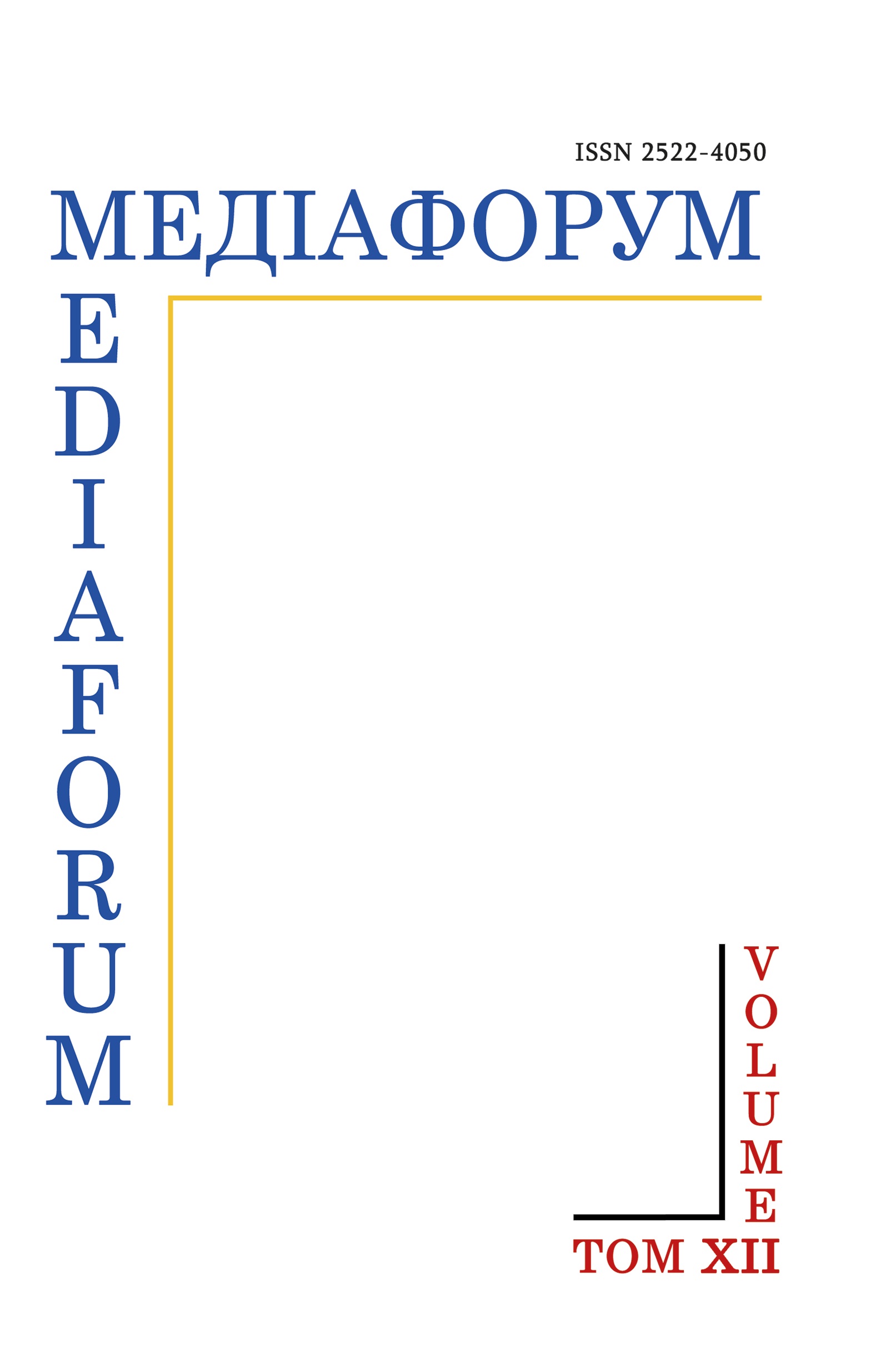Mentality and Mindset as Categories of Sociocultural and Civilizational Anthropology
DOI:
https://doi.org/10.31861/mediaforum.2023.12.95-114Keywords:
mentality, culture, language, sociality, ethnopsychology, behaviorismAbstract
The article examines the content and mechanism of the interaction of mentality and mentality as phenomena of the spiritual and mental life of an ethnic group, a people. The relevance of intelligence is determined by the fact that the tradition of understanding them as synonymous is preserved in scientific research, but at this stage these concepts are becoming more and more controversial. Mentality is a scientific category that reflects a certain phenomenon that is rooted in the depths of people’s life and captures stable, established characteristics of spirituality. Anthropology records the constancy of mentality, its staticity, but at the same time its relative changeability, because it is a mechanism that determines the reaction to the surrounding world. In the terminology of anthropologists, mentality is expressed through the concept of «general instructions» associated with behavioral characte-ristics, which at the same time does not depend on conscious reflection. In other words, mentality can be understood as a system of relatively strong stereotypes, as it necessarily reflects certain static properties of a social type that have developed in the process of life experience. As for mentality, it is a qualitative, identifying characteristic of a social subject that focuses natural-historical and cultural features in itself. The definition of mentality and mentality, their differences, is substantiated on the basis of historiographical research of foreign and domestic scientists, scientific schools of sociology, cultural studies and psychology.
Downloads
References
Blok M. 1986. Apolohyia ystoryy, yly Remeslo ystoryka. M.: Nauka. S. 106, 108.
Brodel F. 2002. Sredyzemnoe more y sredyzemnomorskyi myr v epokhu Fylyppa II: v 3 ch. Ch. 1. Rol sredy. M.: Yazyky slavianskoi kultury. S. 20.
Viko Dzh. 1994. Pidstavy novoi nauky pro pryrodu natsii. Kyiv: Znannia.
Vundt V.1896. Yndyvyduum y obshchestvo. SPb. S. 21.
Vundt V. 1998. Problemy psykholohyy narodov // Prestupnaia tolpa. M.: Nauka. S. 201 - 231.
Hehel H. 1956. Entsyklopedyia fylosovskykh nauk: v 3 t. T. 3. M.: Nauka. S. 56, 59.
Helvetsyi K. 1974. O cheloveke. Sochynenyia: 2 t. M.: Polytknyha. T. 2. S. 183.
Herder Y. H. 1977. Ydey k fylosofyy ystoryy chelovechestva. M.: Polytyzdat. S. 274.
Humboldt V. 1984. Yzbrannye trudy po yazykoznanyiu. M.: Nauka. S.10.
Hurevych A. 1993. Ya. Ot ystoryy mentalnostei k ystorycheskomu syntezu // Spory o hlavnom. Dyskussyy o nastoiashchem y budushchem ystorycheskoi nauky vokruh frantsuzskoi shkolы «Annalov». M.: Nauka. S. 4.
Dodonov R. A. 1999. Teoryia mentalnosty: uchenye o determy-nantakh mыslytelnoi deiatelnosty. Zaporozhe: «Tandem-U». S. 12 -13.
Kalakura Ya., Rafalskyi O., Yurii M. 2017. Mentalnyi vymir ukrainskoi tsyvilizatsii. Kyiv: Heneza. 560 s.
Karpiuk L. 2004. Osnovni pidkhody do rozuminnia mentalitetu suchasnymy vchenymy. URL: https://nte.etnolog.org.ua/zmist/2004/N6/Art12.htm
Kolesova O. V. Problema mentalnosty v kontekste sovremennoi kultury (orhanyzmycheskyi y orhanyzatsyonnыi podkhody). URL: https://www.socionauki.ru/-journal/articles/145692/
Lamsden Ch., Humurst A. 1998. Hennokulturnaia koevoliutsyia: chelovecheskyi rod v stanovlenyy. M.: Nauka. S. 122 -135.
Latsarus M., Shteintal Kh. 1905. Mysly o narodnoi psykholohyy. Voronezh. S. 38.
Levy-Briul L. 1980. Pervobytnoe myshlenye // Psykholohyia myshlenyia. M.: Nauka. S. 131 - 132.
Le Hoff. 1992. Zhak. Tsyvylyzatsyia srednevekovoho Zapada. M.: Prohress. S. 310 - 312.
Lure S. V. Yzuchenye etnycheskoi kartyny myra kak ynterdystsyplynarnaia problema. URL: http://etnopsyhology.narod.ru/ svlourie/articles/interdisciplinary.htm
Monteske Sh. L. 1955. Yzbrannye proyzvedenyia. M.: Polytknyha. S. 412.
Pasechnyk S. Ye. (2012). Do pytannia pro rozriznennia poniat «mentalitet» i «mentalnist» u linhvistytsi ta sumizhnykh dystsyplinakh. Naukovi pratsi. T. 70. Vyp. 57. Mykolaivskyi derzhavnyi humanitarnyi universytet im. P. Mohyly. Mykolaiv. S. 86 - 90.
Popovych M. V., 2006. Kysliakovska N. B., Viatkina N. B. Problemy istorii mentalnosti. Problemy teorii mentalitetu. vidp. red. M. V. Popovych. Kyiv: Naukova dumka. 404 s.
Ruban A. O. 2004. Teoretyko-metodolohichni osnovy formuvannia ukrainskoi mentalnosti v konteksti istoryko-filosofskoho analizu. Multyversum: filosofskyi almanakh. Kyiv: Tsentr dukhovnoi kultury. № 40. S. 140 -143.
Fromm E. 1997. Vtecha vid svobody. Kyiv: Sobor. S. 87.
Fromm E. 1993. Psykhoanalyz y etyka. M.: Nauka. S. 46 -47.
Freid Z. 1990. Psykholohyia bessoznatelnoho. M.: Kanon. S. 244 .
Iunh K. H. 1991. Arkhetyp y symvol. M.: Renessans. S. 95.
Iunh K. H. 1994. Problemy dushy nashoho vremeny. M.: Kanon. S. 64.
Yunh K. H. 1996. Psykholohycheskye typy. M.: «Unyversytetskaia knyha», AST. 716 s.
Iushchyshyn O. I. Poniattia natsionalnoho kharakteru, mentalnosti i natsionalnoi svidomosti yak instrument kulturolohichnoho analizu. URL: http://iai.dn.ua/_u/iai/dtp/CONF//4_2004/articles//stat410.html















